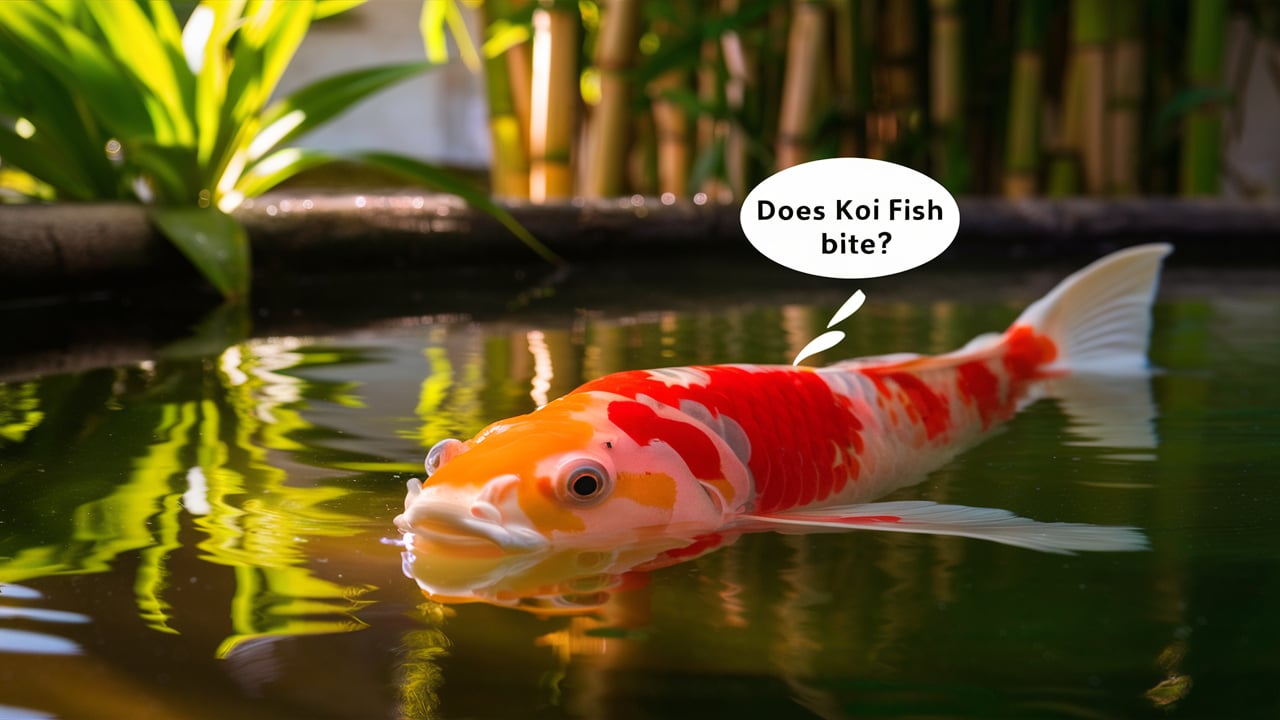Koi fish, with their vibrant colors and graceful movements, are often considered a symbol of peace and serenity. But a common question arises: Does koi fish bite? Join Koi Fish Beauty as we delve into the world of Koi behavior, exploring the truth behind this intriguing question and shedding light on their interactions with humans.
The Gentle Giants: A Look at Koi Behavior
Koi, being members of the carp family, are known for their peaceful and docile nature. They are often described as gentle giants, gracefully gliding through their aquatic environment with a sense of tranquility. However, like any living creature, their behavior can be influenced by various factors, including their environment, diet, and interactions with humans.
Natural Instincts: Food and Defense
Koi, like all fish, have natural instincts driven by survival. Their primary instinct is to seek food, and they often exhibit curious behavior when presented with new objects or movements. This curiosity can sometimes lead to them approaching humans or objects, but it’s not necessarily a sign of aggression.
Environmental Factors: Stress and Territoriality
Koi, like any fish, can become stressed in unfavorable environments. Overcrowding, poor water quality, or a lack of food can lead to increased aggression and territorial behavior. In such cases, they may exhibit defensive behaviors, including biting, if they feel threatened.
Human Interaction: Building Trust and Understanding
Koi are intelligent creatures capable of recognizing their keepers and responding to their presence. Regular interaction, proper feeding, and a calm environment can foster a sense of trust and reduce the likelihood of biting. However, it’s important to remember that Koi are wild animals and should be treated with respect.
Does koi fish bite?
While Koi are generally peaceful, they can bite under certain circumstances. Here’s a closer look at the reasons behind their bites:
Defensive Bites: A Response to Perceived Threats
Koi may bite if they feel threatened or cornered. This is a natural defense mechanism, similar to how other animals might use their teeth to protect themselves. If you approach a Koi aggressively or try to handle it roughly, it may bite in self-defense.

Food-Related Bites: Mistaking Fingers for Food
Koi are curious creatures and may investigate anything that moves, including fingers. If a Koi is hungry or sees your finger as a potential food source, it may bite out of curiosity or hunger.
Territorial Bites: Protecting Their Space
Koi, like many fish, can be territorial, especially during breeding season. If you approach their nesting area or interfere with their breeding activities, they may bite to protect their territory.
Preventing Bites: Building a Harmonious Relationship
While Koi bites are rare, there are steps you can take to minimize the risk:
Respect Their Space: Avoid Aggressive Interactions
Approach Koi calmly and avoid sudden movements or loud noises. Give them space and allow them to approach you at their own pace.
Feed Regularly: Minimize Hunger-Driven Bites
Feed your Koi a balanced diet and ensure they have enough food. This will reduce the likelihood of them mistaking your fingers for food.
Create a Safe Environment: Reduce Stress and Aggression
Provide a spacious, clean, and well-filtered environment for your Koi. Avoid overstocking the pond or tank and ensure adequate water quality.
Handle with Care: Respect Their Sensitivity
If you need to handle your Koi, do so gently and with support. Avoid squeezing or holding them too tightly, as this can cause stress and lead to biting.
What should I do if a Koi bites me?
While Koi bites are rare, it’s important to know what to do if one occurs. Here’s a step-by-step guide:
Wash the Area
Immediately wash the bite area with soap and water. This will help remove any bacteria or debris that may have been introduced.
Assess the Severity
Examine the bite to determine its severity. Most Koi bites are superficial and will only cause a small puncture or pinch. However, if the bite is deep or bleeding heavily, seek medical attention immediately.
Apply Antiseptic
Apply an antiseptic to the bite area to help prevent infection.
Monitor for Infection
Keep an eye on the bite area for any signs of infection, such as redness, swelling, pain, or pus. If you notice any of these symptoms, consult a doctor.
Additional Tips:
- Don’t Panic: Koi bites are generally not serious, so stay calm and follow the steps above.
- Avoid Scratching: Scratching the bite area can increase the risk of infection.
- Consult a Doctor: If you have any concerns about the bite, or if it doesn’t seem to be healing properly, consult a doctor.
Conclusion
Does koi fish bite? While Koi bites are uncommon, it’s important to understand their behavior and take precautions to avoid them. By respecting their space, providing a safe environment, and interacting with them calmly, you can build a harmonious relationship with these gentle giants. Remember, Koi are a valuable part of the aquatic ecosystem, and their well-being should be our priority.

Related Posts
How To Take Care Of Koi Fish? Guide to a Thriving Aquatic Journey
Koi Fish Ulcer: Understanding and Preventing This Health Issue
Colors Of Koi Fish: A Journey Through Nature’s Palette